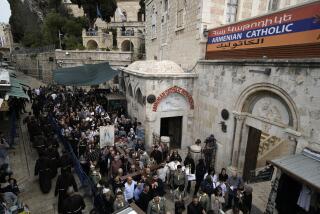Op-Ed: Good Friday challenges us to confront our epidemic of misery and misplaced priorities
The grounds of St. Francis Cathedral Basilica in Santa Fe, N.M., include a garden with bronzes depicting the 14 Stations of the Cross, from Jesus’ death sentence in Pilate’s courtroom to the entombment of his lifeless body in a borrowed sepulcher. Sculpted by a local artist, Gib Singleton, the representations are raw and visceral. The suffering and the passion of Christ that Christians remember during Holy Week is rendered here in graphic, intimate detail.
This week, the abandonment depicted so effectively by Singleton is amplified by the empty streets surrounding the cathedral. Like most places across America and around the world, downtown Santa Fe, the plaza and the cathedral itself, normally teeming with tourists and locals, are empty. In this moment of pandemic, we all inhabit a surreal universe.
With the exception of some reckless and vainglorious megachurches — and these people call themselves pro-life? — religious groups have been forced to make adjustments, from virtual Seders to drive-by palms on Palm Sunday. Elsewhere in New Mexico, pueblos have suspended traditional dances, and the archbishop has canceled the annual Good Friday pilgrimage from Santa Fe to the healing Sanctuario in Chimayó.
Some groups can adjust more easily than others. If the centerpiece of your worship is singing or a sermon, that’s one thing — and relatively easily translated into digital form. If, on the other hand, the climax of worship is Holy Communion, the presence of Christ communicated to the faithful in tactile form, that’s quite another.
The challenge of Holy Week and the Jewish Passover, its religious parallel, is coming to terms with suffering. Passover recalls the bondage and the eventual deliverance of ancient Israel from Pharaoh’s servitude, while in the days from Palm Sunday to Easter, Christians commemorate the crucifixion of Jesus and the redemption of humanity.
In 2020, with the whole world paralyzed, fearful or worse, the challenge for the faithful — for everyone — lies in finding some meaning in our affliction.
Watching commerce and the economy grind nearly to a halt, with the attendant misery of workers without income, we witness the ripple effects of suffering. And in the enforced slowdown, it’s tempting to wonder if the current crisis is an attempt to awaken us to a more comprehensive danger. Is the relentless bustle and the wanton pursuit of consumer goods really worth the collateral damage to the planet? Is the performance of financial markets the real index of our happiness?
And what about the inequality of suffering? Consider prisoners or refugees confined in tight quarters with inadequate food and medical attention, a breeding ground for illness. The nation’s affluent flee to their second homes while those less fortunate hunker down in environments far less salubrious. Some victims have certain access to healthcare; others don’t.
The government is spending billions on a border wall, with money diverted from other purposes, and in so doing it is dynamiting Native American burial sites, seizing private property by eminent domain and choking off trans-border corridors for wildlife. At the same time, millions do not know how they will negotiate the most basic needs of shelter and food in the coming weeks, and hospitals plead for essential equipment and basic supplies.
Perhaps the coronavirus is forcing us to a reckoning with our priorities. Perhaps this is an opportunity to imagine what kind of world we wish to inhabit once the crisis has passed.
Finally, how do we come to terms with those who succumb to the coronavirus? Many if not most are dying alone, cut off from family and loved ones who cannot risk being present there, in the shadow of death. Like Jesus in his Good Friday moment of anguish, they are alone.
The coronavirus, Passover and Holy Week remind us that suffering is part of the human condition; we all face the prospect of death. But rarely has our own contingency confronted so many of us so vividly and so urgently.
Christians believe that the triumph of Easter Sunday would not have been possible without the misery of Good Friday. May we, all of us, somehow find the grace and the wisdom to discern glimmers of hope and meaning — and maybe even a reformation of our lives and national character — in this time of suffering.
Randall Balmer, an Episcopal priest and a writer currently working from Santa Fe, N.M., teaches at Dartmouth College.
More to Read
A cure for the common opinion
Get thought-provoking perspectives with our weekly newsletter.
You may occasionally receive promotional content from the Los Angeles Times.










